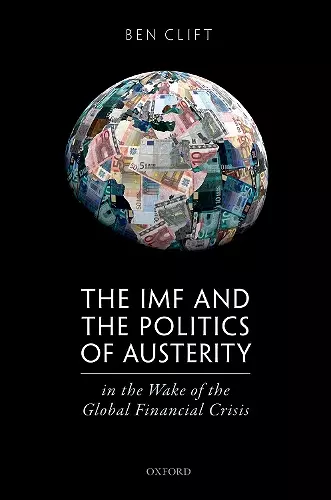The IMF and the Politics of Austerity in the Wake of the Global Financial Crisis
Format:Hardback
Publisher:Oxford University Press
Published:22nd Feb '18
Currently unavailable, and unfortunately no date known when it will be back

This book explores the IMF's role within the politics of austerity by providing a path-breaking comprehensive analysis of how the IMF approach to fiscal policy has evolved since 2008, and how the IMF worked to alter advanced economy policy responses to the global financial crisis (GFC) and the Eurozone crisis. It updates and refines our understanding of how the IMF seeks to wield ideational power by analysing the Fund's post-crash their ability to influence what constitutes legitimate knowledge, and their ability fix meanings attached to economic policies within the social process of constructing economic orthodoxy.This book is interested in the politics of economic ideas, focused on the assumptive foundations of different approaches to economic policy, and how the interpretive framework through which authoritative voices evaluate economic policy is an important site of power in world politics. After establishing the internal conditions of possibility for new fiscal policy thinking to emerge and prevail, detailed case studies of IMF interactions with the UK and French governments during the Great Recession drill down into how Fund seeks to shape the policy possibilities of advanced economy policy-makers and account for the scope and limits of Fund influence. The Fund's reputation as a technocratic, scientific source of economic policy wisdom is important to for its intellectual authority. Yet, as this book demonstrates, the Fund makes normatively driven interventions in ideologically charged economic policy debates. The analysis reveals the malleability of conventional wisdoms about economic policy, and the processes of their social construction.
That economic ideas are the currency of power in the corridors of the IMF is well known. But how these ideas are developed, shared, and spread is largely assumed. Ben Clift's excellent book changes that. By leveraging constructivist insights on how actors frame problems to a framework that stresses processes of ideational reconciliation and recognition within the fund, Clift shows the IMF to be more ideationally pluralist, and yet more political, than most analysts have shown to date. * Mark Blyth, Eastman Professor of Political Economy, The Watson Institute for International Affairs, Brown University. *
Ben Clift paints a rich picture of the IMF as it evolved during the global financial crisis. He claims, controversially, that when it came to advanced non-borrowing members the IMF pivoted back to its Keynesian roots following a long embrace of neoliberalism. The book challenges standard totalizing IMF narratives at a time when that institution is adjusting unevenly to the new environment in which it is operating. * Professor Ilene Grabel, Professor of International Economics, Josef Korbel School of International Studies, University of Denver *
This theoretically and empirically rich book challenges those who see the IMF always as an ideologically rigid enforcer of fiscal austerity. In analyzing the Fund's less orthodox positions in post-2008 debates about fiscal policy in the European context, Clift develops a fascinating analysis that should be read by all those interested in the politics of economic ideas, the ideational significance of international organizations, and global financial governance after the 2008 financial crash. * Eric Helleiner, Professor of Political Science, University of Waterloo. *
ISBN: 9780198813088
Dimensions: 241mm x 164mm x 24mm
Weight: 610g
298 pages